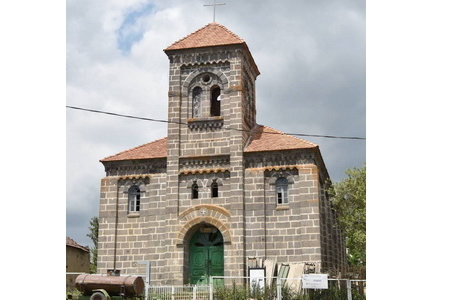19th century German settlers’ church restored in Georgia’s south

An authentic monument of the 19th century German settlers in Georgia is now safe from natural phenomena after the Evangelist-Lutheran church in southern Georgia's village of Trialeti underwent rehabilitation efforts by experts.
Designated as a cultural heritage monument in 2016, the 1866 church is located in the Tsalka Municipality village and had suffered damage to its roof via many decades of neglect.
The National Agency for Cultural Heritage Preservation of Georgia said the monument's roof had collapsed at several spots, meaning atmospheric precipitation entered the church, damaging wall plastering.

A photograph of the church before the restoration efforts on its roof. Photo: Georgia's Cultural Heritage Preservation Agency.
Restoration efforts focusing on the construction were launched within a project organised by the agency and financed by the German Foreign Office.
The repaired roof means the exterior of the church has been kept in its authentic condition, while the interior is significantly altered by addition of constructions throughout its later history.
The church was established in 1862, with construction finalised in 1866.

The Trialeti church after the completion of the works. Photo: Georgia's Cultural Heritage Preservation Agency.
It was founded by German settlers in the Caucasus, who arrived in Georgia in the second half of the 1810s.
Initially founding the village Elisabethtal (now Asureti) on their arrival, the settlers were later moved to colony of Alexandershilf, now known as the village of Trialeti.
After the 1921 Soviet takeover of Georgia, religious service was prohibited at the church starting in the 1930s.
The venue served as a warehouse, a club and a cinema theatre following the prohibition, but later remained without function.
 Tweet
Tweet  Share
Share



